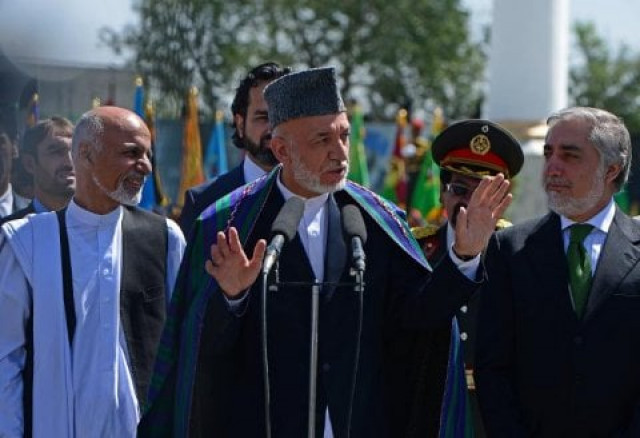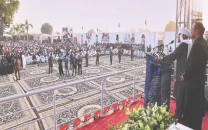Karzai and Ghani: A tale of two presidents
Former Afghan president’s anti-Pakistan remarks seen as counterproductive

Karzai and Ghani: A tale of two presidents
The blame game during Karzai’s nearly 13-year rule had been the major obstacle in Pak-Afghan cooperation on security, border issues and peace with the Taliban.
President Ashraf Ghani rightly pointed out in his joint presser with Prime Minister Nawaz Sharif in Islamabad on November 15 that the two sides resolved the years of problems in just three days. Ghani’s mention of 13 years was a direct reference to the tense Pak-Afghan relations during Karzai’s tenure.

Besides differences over cross-border shelling, illegal movement of Taliban militants and certain border issues, Karzai always blamed Pakistan for not “taking practical steps” to bring the Taliban to the negotiation table.
Pakistan may have contacts with the Taliban and Hizb-e-Islami of Gulbuddin Hekmatyar, but like any other country, it cannot dictate to these groups.
The Taliban’s decision to open their political office in Qatar was a clear message that they want to take decisions independently. The Qatar office was an opportunity for Karzai to use the channel to establish contact with the Taliban, but the Taliban leaders insist Karzai himself proved to be a hurdle in the possible role of the office in peace talks. Fearing that he would be cornered if the Taliban and the US start face-to-face dialogue in Qatar, Karzai raised objections to the Taliban office which led to its immediate closure.
Karzai had promised President Ghani in his farewell speech that he would support his government. However, it is now widely believed that he has not honoured his commitment to help his successor and is, in fact, trying to undermine the new leader’s efforts to improve relations with Pakistan.
“I will strongly support the new president, the government and the constitution and will be at their service,” Karzai had stated in his last speech on September 28. Yet, Karzai did not spare Pakistan in a series of interviews later. His remarks are in no way helpful for the new government’s quest for good neighbourly ties.
In his first media interaction after he stepped down, the former Afghan President told Radio Azadi his 20 visits to Pakistan could not help improve relations with Pakistan.
Karzai offered his comments just three days after Ghani wrapped his two-day visit to Pakistan that was described as successful by both sides. The Afghan independent media and majority of political commentators were also upbeat at the outcome of the Ghani’s first visit to Pakistan.
Karzai’s repetition of allegations encouraged his former close aides to keep directing criticism at Pakistan.
Umer Daudzai, who has served as interior minister in Karzai’s cabinet and his ambassador in Pakistan, said recently that Kabul’s move to seek Islamabad’s help in the peace process will be a “waste of time.” Ignoring Karzai regime’s complete failure to bring the Taliban to the negotiation table, Daudzai criticized Ghani’s policy of reconciliation. Daudzai feels President Ghani should have done in two months what Karzai could not do in 13 years.
“The Afghan government will commit a big mistake if it wants to get Pakistan’s cooperation in the peace process.” Daudzai told a news conference in Kabul on Thursday.
“If we expect Pakistan will resolve our problem and encourage the Taliban to come to the negotiation table, these all are dreams and madness,” the interior minister said days after President Ghani stopped him and other acting ministers from handing over charge to deputy ministers.
The time is also ripe for Pakistan to review its policies and adopt a realistic approach to push for the peace process in Afghanistan in order to avoid any instability in the neighbouring country. A policy to encourage Taliban leaders to join the peace process would be more helpful than using any pressure tactics or talking to low tier Taliban militants under the pretext of peace talks.
Meanwhile, Kabul will have to take the initiative for dialogue with the real Taliban leaders and through the Qatar office. The Taliban supreme leader Mullah Muhammad Omar in his last “Eid message” had categorically stated it is the only channel through which to contact them. All other options will be an exercise in futility.
Published in The Express Tribune, December 6th, 2014.



















COMMENTS
Comments are moderated and generally will be posted if they are on-topic and not abusive.
For more information, please see our Comments FAQ